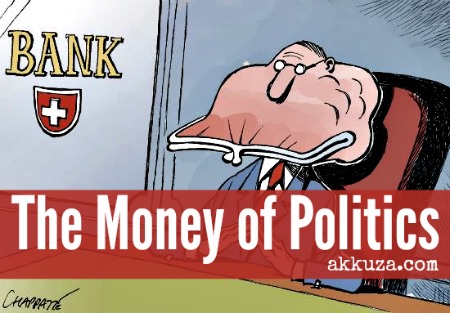The Money of Politics
In the current whirlwind that is the Swissleaks scandal we risk missing the wood for the trees. Public opinion is easily distracted by petty insinuations and suppositions that run on the lines of taste and “intuition”. Assumptions are always preferable to sound facts and are the refuge of the lazy or the manipulating. As news broke of the names of ex-PN ministers Ninu Zammit and Michael Falzon appearing on the list of people who had funds stashed away in Switzerland we were confronted with the inevitable tsunami of disdain. This was tax avoidance of the highest order, aggravated to boot by the failed declaration of funds when performing duties as a minister of government. We were also told that both had benefited from an “amnesty” having repatriated the funds to Malta. What that really means is that they paid much less tax than they originally owed and it does nothing to clear their false declarations earlier.
In many ways an amnesty in this sense is a legal form of money laundering. Monies that had been “disapparated” into a vault at the Gringot’s Bank far from the scrutiny of the taxman are allowed back into circulation once the payment of a percentage fine is made. The real question is: how was that money made? Why was it hidden away for so long? Was tax avoidance really the only reason? That the money was legitimately acquired and not through, for example, trading in influence, is something for which we have to take the word of the honourable gentlemen who had given sworn statements of assets before parliament before and in which statements they failed to mention the existence of such funds. Forgive me if I remain skeptical.
It gets worse. The current Premier (that’s his new nick – all 4.2 million euro of it) could in all probability have been the one to have accorded the amnesty to the gentlemen in question. When questioned on the matter he took refuge in his usual “tu quoque” rubbish – coming up with a reference to Austin Gatt’s forgotten funds at UPS. The problem is that by focusing on the Where? – i.e. Swiss funds, we miss the more important questions of Why? and What? Why do ministers underdeclare their assets? What dangers lie hidden when they do so? Muscat’s cabinet and MP’s include a minister for Gozo who declared practically a minimum wage in earnings and an ex-Minister who still cannot explain having half a million euros running around the house (to mention but two).
The Cafe Premier saga only goes to worsen the situation (and not just the perception) when it comes to seeing how closely knit are the activities of our representatives to the business community. While we were all aghast at Michael Falzon’s 460k in Switzerland we could read about a 210k commission over a government deal to buy back its own property (rather than simply kicking out a tenant who was not paying). The PM was in on the deal – there are emails to prove it. Not too far away from the Premier, in the law courts, the Enemalta Scandal was still unfolding. Yet again more wheels and cogs being oiled and still no one uses the magic word in Maltese : “Tixħim” (bungs/backhanders).
In the end there is a money trail to be followed. It serves to emphasise why this government cannot keep hiding behind chinese walls when it comes to important deals such as the Transport system and the new power stations and contracts given to consultants. Transparency is only the first step to combat corruption and until now the murkiness within which our politicians function is not helping in any way. We could potentially be very close to a situation that was current in Italy in 1992 – and the danger is that, just as happened in Italy – the big fish survive the cull to the detriment of a few scapegoats.
Which is why we need real non-partisan investigative reporting and a stronger arm of the law. otherwise the wheels will just keep turning and the oil will keep flowing. The only suckers will be the people. For a change.









Craxi, God less his soul, was no saint. However I think his comments in the video you put up are true and honest.
I fail to understand the logic of your last paragraph. You state that we risk a repeat of Italy’s tangentopoli injustices in the 90’s. However how does a stronger free press and more law enforcement avoid this risk? Italy has such a very powerful prosecuting authority and a vibrant free press in the 90s.